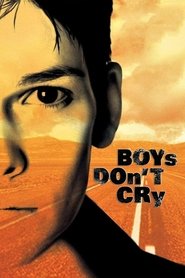I was dumbfounded to learn that in researching material before making this film, director Kimberley Pierce could still clearly see Brandon's blood on the walls of the rural farmhouse.
A difficult watch. Watching this 25 years on, the mindset and terminology might have undergone some significant changes, but the way gender boundaries are heavily policed men and women, the medical gaslighting that's eventually internalised ("I'm having a sexual identity crisis"), the victim-blaming ("yes but he lied and forged a check"), the indifference at best of law enforcement, and, most prominently, the underlying threat (or fatal reality) of violence inherent in the contemporary trans experience has clearly not changed a bit.
Some other reviews have gone into more detail about the complete erasure of a Black friend murdered at the same time. I think this is highly illuminating about the precise borders of compassion in the West: for all her bravado performance of a trans man, Hilary Swank is still a white woman and thus remains a fitting vessel for an American audience's compassion. A Black man evidentally is not. (Incidentally, I think Chinonye Chukwu could have learned something about conveying cinematic victimhood for their 2022 film Till. Making 14-year-old Emmett into a saint may indeed be completely accurate, but it also has a certain hollowness to it backed up by a hint of moral blackmail — who's going to be the person to say the effect is mawkish and overdone? One cannot easily make that charge against Boy's Don't Cry.) Anyway, the fact that race was not really a subject of the film is interesting given its implicit emphasis of the role of class in Brandon's murder. It is something of a shame that film cannot depict a middle-class family instead, as that might have avoided the suggestion that transphobia is borne of the inherent ignorance of rural blue-collar culture.
Boy's Don't Cry was initially given an NC-17 rating by the MPAA, in part due to the moral panic surrounding South Park: Bigger, Longer & Uncut's 'R' rating. An NC-17 rating would not merely have barred those 16 or under from seeing Boy's Don't Cry, but crucially, it would have acted as a de facto ban from any kind of widespread distribution given the prevalence of the theatres that refuse to carry NC-17 films as a matter of course. This would, without exaggeration, have ensured it would have been a commercial disaster, and would have naturally stymied funding for other LGBT movies. There's a good-length essay (and perhaps even a book) to be written about the use of the NC-17 rating as a method of soft censorship in the US, a place that hypocritically calls itself the home of the First Amendment. Given an 'R' after extensive cuts to the LGBT-inflected scenes (and not the murder), the rating system had the effect of restricting the content within Boy's Don't Cry, but also what would be filmed and financed in the years afterwards.
I'd give Sally Jane Black's Letterboxd review a read, if only for their observation that the film "pulls inexorably toward the violence in a way that deafens the trans experience in a way—despite that violence being a terrifying part of our experience," and their summary of the film as "an experiment in cis-gaze and misunderstanding, a bumbling insult to the trans man who was killed, in a manner that simply encourages more misunderstanding (and thus more death)".
One last thing. The theory that Roger Ebert would not have 'survived Twitter' is borne out by his contemporary review of this film which boldly claims that Brandon was "not a transsexual, a lesbian, a cross-dresser, or a member of any other category on the laundry list of sexual identities", and suggests that "the intriguing border between the genders must have been more inviting to cross when that was seen as an opportunity rather than a pathology."
What the movie gets so well is not merely Brandon's attraction to Lana, and hers to her, but also the curious way Brandon's sexual charisma miswires the sexual politics of the situation. For the secret is that, in their way, John and Tom are drawn to Brandon, too. They're picking up on something they don't quite realize is there; they think he's cute and funny, and are forever playing grab-ass and acting on all those strange, incoherent sexual impulses that men cannot articulate and deeply deny but nevertheless randomly feel.
— Stephen Hunter (The Washington Post)
It's not just about two stupid thugs who killed somebody. It's about these guys whose world is so tenuous and so fragile that they can't stand to have any of their beliefs shattered.
— Christine Vachon (producer)

